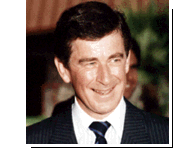
|


|


Peter G. Bourne, who was President Carter's drug-policy chief in 1977 and 1978, is a psychiatrist and author. He is chairman of the Department of Psychiatry at St. George's University Medical School in Grenada. His books include "Fidel: A Biography of Fidel Castro" and the recently-published "Jimmy Carter: A Comprehensive Biography from Plains to Post-Presidency." He was interviewed by FRONTLINE in April 1997.
|

|
What did you do as President Carter's drug-policy chief in attempting to stop heroin production in countries like Burma?

|

We had a program in Mexico to spray poppies there that appeared to be quite effective. And we thought that crop substitution programs in the Golden Triangle, together with support of the government's efforts to eradicate cultivation, could in fact significantly limit the supply of heroin coming onto the world market. We, in addition, had established a satellite system that allowed us to monitor where opium was being grown. I think we were quite optimistic that we could gradually tighten the noose around the cultivation of heroin and really bring down the level to a signicant decree.
|

|
What success did you have?

|

In the early stages it was very successful. There was a diminution in the availability of opium and heroin on the world markets. The price was driven up very high.
|

|
What did you do in Burma?

|

It was more of a direct interdiction effort with the provision of helicopters to the Burmese government in an effort to stop the supply trains of opium coming out of the cultivation areas. I should say that the effort there was less effective.
|

|
Why?

|

There was not an effective crop substitution program being implemented in Burma, and the area where opium was being grown was infinitely more inaccessible.
|

|
In retrospect do you think your strategy was on the right track?

|

We had not fully appreciated the extent to which heroin will grow in vast areas of the world. So that if you are able to reduce its production in one area, it's very easy for it to spring up somewhere. As long as there are immense profits to be made, that will happen.
|

|
Are you saying no strategy can work?

|

I think that the best that we can hope for is a strategy that keeps the pressure on the cultivators and the governments that are actively involved in supporting the cultivation so that we keep the price relatively high.
|

|
Modest ambitions?

|

I think it's politically unacceptable to say this is a problem that does not have an ultimate solution. There is no political mileage in saying we can't solve this problem. But I think the reality is that we cannot solve it in its entirety and that we have to accept that any measures we take are only going to be palliative.
|

|
Is the situtation particularly difficult in Burma?

|

Immense amounts of money are going directly to the government and into the pockets of the leaders in Burma from the narcotics business. And that makes it particularly difficult to deal with.
|

|
Why did you go to Burma in 1994 to visit Khun Sa, the opium war lord and Shan State nationalist leader?

|

I thought the United States government really had an extraordinary opportunity with Khun Sa, if it could get beyond its shortsighted view of merely labeling him as a drug war lord and maybe work out an arrangement with him, as he was suggesting, to get out of the opium business in return for U.S. support of their independence movement. This I knew would put tremendous pressure on the government in Rangoon and maybe make them more receptive to the international community in terms of improving human rights and their own involvement in drug trafficking.
|

|
Your perception of Khun Sa?

|

My conclusion was that he was very committed to the independence movement, and I think some of that had to do with the stage in life that he had reached, that he didn't want to go down in history as just somebody who was involved in drugs. And I think he saw an opportunity for himself, in effect, to be a national hero leading an independence movement.
|

|
Have you changed your mind since he cut a deal with the Burmese dictatorship?

|

Yes. He abandoned the Shan independence movement and is now living very comfortably in Rangoon.
|

|
What can President Clinton do, if anything, about Burma's heroin production?

|

I think what we need to do is to try to increase the dialogue, to have more interaction with the Burmese government, and try to influence them to change their ways rather than walling them off and isolating them, because it is their very isolation that really allows them to be so oppressive to their people.
|

|
What about using trade as a lever against Burma as a condition of tougher drug enforcement?

|

The amount of trade with Burma from the U.S. is so tiny. If you could get all the other nations of the world to abide by such an embargo, it might remotely have some potential. But the U.S. alone is going to have no impact.
|

|
The other nations of the world won't agree?

|

No, they won't. I think the talk of a hardline solution really is the talk of frustration. I think when one has run out of all other ideas, you up the testosterone level.
|

|
|
home | interviews | how can we crack down? | maps & charts | transforming poppies to heroin | heroin in the brain | opium throughout history | viewer reactions | press | tapes & transcripts | explore FRONTLINE | pbs online | wgbh
New Content Copyright © 1998 PBS and WGBH/Frontline

|